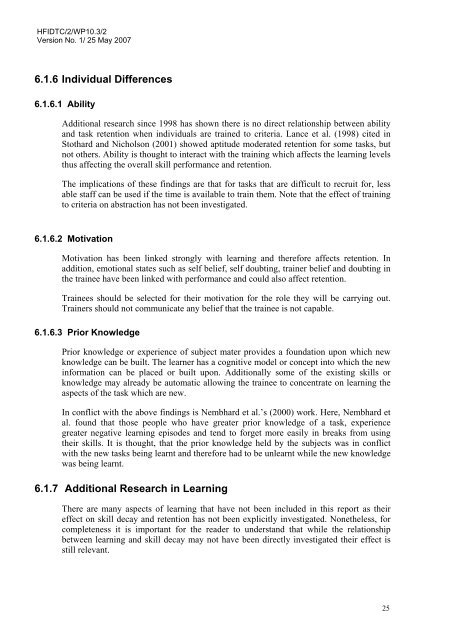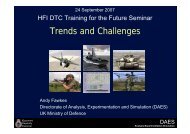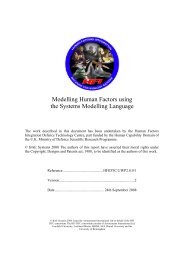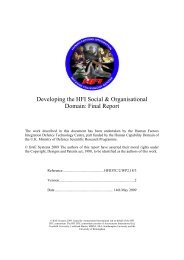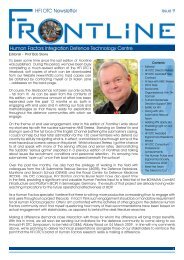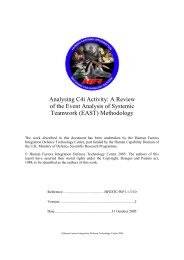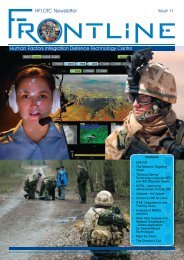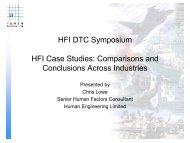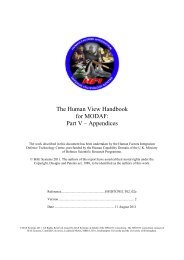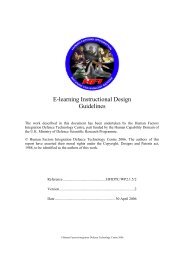Literature Review on Skill Fade - Human Factors Integration ...
Literature Review on Skill Fade - Human Factors Integration ...
Literature Review on Skill Fade - Human Factors Integration ...
Create successful ePaper yourself
Turn your PDF publications into a flip-book with our unique Google optimized e-Paper software.
HFIDTC/2/WP10.3/2<br />
Versi<strong>on</strong> No. 1/ 25 May 2007<br />
6.1.6 Individual Differences<br />
6.1.6.1 Ability<br />
Additi<strong>on</strong>al research since 1998 has shown there is no direct relati<strong>on</strong>ship between ability<br />
and task retenti<strong>on</strong> when individuals are trained to criteria. Lance et al. (1998) cited in<br />
Stothard and Nichols<strong>on</strong> (2001) showed aptitude moderated retenti<strong>on</strong> for some tasks, but<br />
not others. Ability is thought to interact with the training which affects the learning levels<br />
thus affecting the overall skill performance and retenti<strong>on</strong>.<br />
The implicati<strong>on</strong>s of these findings are that for tasks that are difficult to recruit for, less<br />
able staff can be used if the time is available to train them. Note that the effect of training<br />
to criteria <strong>on</strong> abstracti<strong>on</strong> has not been investigated.<br />
6.1.6.2 Motivati<strong>on</strong><br />
Motivati<strong>on</strong> has been linked str<strong>on</strong>gly with learning and therefore affects retenti<strong>on</strong>. In<br />
additi<strong>on</strong>, emoti<strong>on</strong>al states such as self belief, self doubting, trainer belief and doubting in<br />
the trainee have been linked with performance and could also affect retenti<strong>on</strong>.<br />
Trainees should be selected for their motivati<strong>on</strong> for the role they will be carrying out.<br />
Trainers should not communicate any belief that the trainee is not capable.<br />
6.1.6.3 Prior Knowledge<br />
Prior knowledge or experience of subject mater provides a foundati<strong>on</strong> up<strong>on</strong> which new<br />
knowledge can be built. The learner has a cognitive model or c<strong>on</strong>cept into which the new<br />
informati<strong>on</strong> can be placed or built up<strong>on</strong>. Additi<strong>on</strong>ally some of the existing skills or<br />
knowledge may already be automatic allowing the trainee to c<strong>on</strong>centrate <strong>on</strong> learning the<br />
aspects of the task which are new.<br />
In c<strong>on</strong>flict with the above findings is Nembhard et al.’s (2000) work. Here, Nembhard et<br />
al. found that those people who have greater prior knowledge of a task, experience<br />
greater negative learning episodes and tend to forget more easily in breaks from using<br />
their skills. It is thought, that the prior knowledge held by the subjects was in c<strong>on</strong>flict<br />
with the new tasks being learnt and therefore had to be unlearnt while the new knowledge<br />
was being learnt.<br />
6.1.7 Additi<strong>on</strong>al Research in Learning<br />
There are many aspects of learning that have not been included in this report as their<br />
effect <strong>on</strong> skill decay and retenti<strong>on</strong> has not been explicitly investigated. N<strong>on</strong>etheless, for<br />
completeness it is important for the reader to understand that while the relati<strong>on</strong>ship<br />
between learning and skill decay may not have been directly investigated their effect is<br />
still relevant.<br />
25


